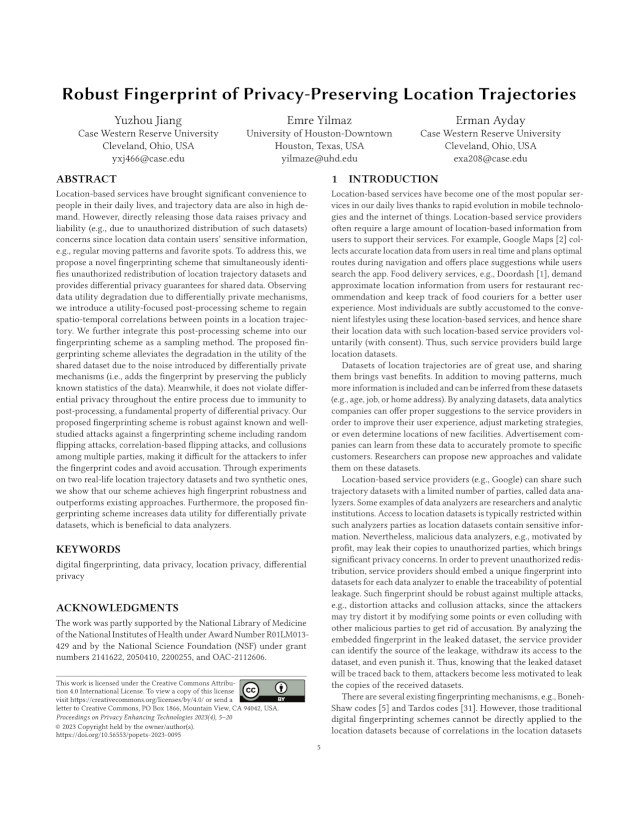Robust Fingerprint of Privacy-Preserving Location Trajectories
Authors: Yuzhou Jiang (Case Western Reserve University), Emre Yilmaz (University of Houston-Downtown), Erman Ayday (Case Western Reserve University)
Volume: 2023
Issue: 4
Pages: 5–20
DOI: https://doi.org/10.56553/popets-2023-0095
Abstract: Location-based services have brought significant convenience to people in their daily lives, and trajectory data are also in high demand. However, directly releasing those data raises privacy and liability (e.g., due to unauthorized distribution of such datasets) concerns since location data contain users' sensitive information, e.g., regular moving patterns and favorite spots. To address this, we propose a novel fingerprinting scheme that simultaneously identifies unauthorized redistribution of location trajectory datasets and provides differential privacy guarantees for shared data. Observing data utility degradation due to differentially private mechanisms, we introduce a utility-focused post-processing scheme to regain spatio-temporal correlations between points in a location trajectory. We further integrate this post-processing scheme into our fingerprinting scheme as a sampling method. The proposed fingerprinting scheme alleviates the degradation in the utility of the shared dataset due to the noise introduced by differentially private mechanisms (i.e., adds the fingerprint by preserving the publicly known statistics of the data). Meanwhile, it does not violate differential privacy throughout the entire process due to immunity to post-processing, a fundamental property of differential privacy. Our proposed fingerprinting scheme is robust against known and well-studied attacks against a fingerprinting scheme including random flipping attacks, correlation-based flipping attacks, and collusions among multiple parties, making it difficult for the attackers to infer the fingerprint codes and avoid accusation. Through experiments on two real-life location trajectory datasets and two synthetic ones, we show that our scheme achieves high fingerprint robustness and outperforms existing approaches. Furthermore, the proposed fingerprinting scheme increases data utility for differentially private datasets, which is beneficial to data analyzers.
Keywords: digital fingerprinting, data privacy, location privacy, differential privacy
Copyright in PoPETs articles are held by their authors. This article is published under a Creative Commons Attribution 4.0 license.


